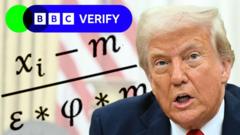The latest tariffs announced by President Trump could significantly impact the rapidly growing energy storage industry in the United States, particularly concerning lithium-ion batteries that are crucial for utilizing renewable energy sources like wind and solar power. Over the past five years, the use of grid batteries has surged, with companies deploying large-scale batteries capable of storing energy for later use. However, with the introduction of a hefty 64.5 percent tariff on imported batteries from China—which constituted 69 percent of U.S. lithium-ion battery imports in 2024—experts warn this move could drastically hinder efforts to enhance grid reliability and expand clean energy capacity.
Trump's New Tariffs Loom Over U.S. Energy Storage Growth

Trump's New Tariffs Loom Over U.S. Energy Storage Growth
The tariffs imposed by President Trump on imported batteries threaten to slow down the proliferation of renewable energy solutions across the U.S., particularly in sectors utilizing solar and wind power.
Energy firms were expected to bolster their capacity for energy storage this year significantly, amidst projections of deploying more than 18,000 megawatts of battery capacity—sufficient to support the output from numerous nuclear reactors for hours. This growth was anticipated to be underpinned by advancing battery technologies which are aiding utilities in reducing reliance on fossil fuels, especially during peak demands. Critics, including GridStor policy expert Jason Burwen, emphasize that the tariffs may throttle the momentum of energy storage deployment, presenting substantial challenges for business viability and grid stability.
While the U.S. energy storage sector aims for a greener future through technological innovation, the newly imposed tariffs could act as a barrier to achieving these sustainability goals, forcing companies to reassess strategies in response to rising costs and potential supply chain disruptions.
As companies evaluate the ramifications of these tariffs, the energy storage landscape may face a critical juncture that will determine the pace and scale of America's renewable energy transition.
While the U.S. energy storage sector aims for a greener future through technological innovation, the newly imposed tariffs could act as a barrier to achieving these sustainability goals, forcing companies to reassess strategies in response to rising costs and potential supply chain disruptions.
As companies evaluate the ramifications of these tariffs, the energy storage landscape may face a critical juncture that will determine the pace and scale of America's renewable energy transition.





















